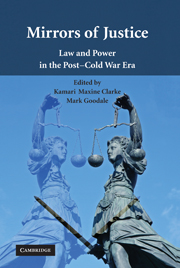Book contents
- Frontmatter
- Contents
- Editor Biographies
- Contributors
- Acknowledgments
- Introduction: Understanding the Multiplicity of Justice
- 1 Beyond Compliance: Toward an Anthropological Understanding of International Justice
- PART I JUSTICE AND THE GEOGRAPHIES OF INTERNATIONAL LAW
- PART II JUSTICE, POWER, AND NARRATIVES OF EVERYDAY LIFE
- PART III JUSTICE, MEMORY, AND THE POLITICS OF HISTORY
- 11 Impunity and Paranoia: Writing Histories of Indonesian Violence
- 12 National Security, Weapons of Mass Destruction, and the Selective Pursuit of Justice at the Tokyo War Crimes Trial, 1946–1948
- 13 Justice and the League of Nations Minority Regime
- 14 Commissioning Truth, Constructing Silences: The Peruvian Truth Commission and the Other Truths of “Terrorists”
- Epilogue: The Words We Use: Justice, Human Rights, and the Sense of Injustice
- Index
- References
12 - National Security, Weapons of Mass Destruction, and the Selective Pursuit of Justice at the Tokyo War Crimes Trial, 1946–1948
Published online by Cambridge University Press: 25 January 2010
- Frontmatter
- Contents
- Editor Biographies
- Contributors
- Acknowledgments
- Introduction: Understanding the Multiplicity of Justice
- 1 Beyond Compliance: Toward an Anthropological Understanding of International Justice
- PART I JUSTICE AND THE GEOGRAPHIES OF INTERNATIONAL LAW
- PART II JUSTICE, POWER, AND NARRATIVES OF EVERYDAY LIFE
- PART III JUSTICE, MEMORY, AND THE POLITICS OF HISTORY
- 11 Impunity and Paranoia: Writing Histories of Indonesian Violence
- 12 National Security, Weapons of Mass Destruction, and the Selective Pursuit of Justice at the Tokyo War Crimes Trial, 1946–1948
- 13 Justice and the League of Nations Minority Regime
- 14 Commissioning Truth, Constructing Silences: The Peruvian Truth Commission and the Other Truths of “Terrorists”
- Epilogue: The Words We Use: Justice, Human Rights, and the Sense of Injustice
- Index
- References
Summary
The Allied victory in 1945 produced two innovative but not necessarily compatible constructions of justice. The first was the agreement among the Allies (United States, Great Britain, the Soviet Union, and France) to jointly prosecute the individual leaders of the defeated Axis powers for waging aggressive war and committing crimes against humanity, particularly the mass murder and torture of civilians. This consensus generated the initial Nuremberg trial (1945–1946) and then the International Military Tribunal for the Far East (IMTFE), also known as the Tokyo war crimes trial.
The second Allied consensus was that Germany and Japan had to be militarily occupied, purged of fascism (which was already defeated in Italy), and made incapable of threatening world peace. As early as 1946, as part of its grand strategy, the United States envisioned the reinvention of both these defeated enemies as bulwarks of free-market democracy against the geopolitical threat of the Soviet Union, west and east. For Japan, the postwar nation-building project entailed radical constitutional reform and cultural change. Less attention has been paid to how the U.S. Cold War national security objectives – founded on the legitimacy of its weapons of mass destruction (WMD) – ultimately corrupted the IMTFE by excluding evidence of mass murder with germ weapons and by failing to indict the responsible Japanese leaders for these crimes.
In contemporary times, American political indifference to genocide and torture in the Balkans and Africa has been analyzed as part of its historical reluctance to intervene in international conflict.
- Type
- Chapter
- Information
- Mirrors of JusticeLaw and Power in the Post-Cold War Era, pp. 248 - 269Publisher: Cambridge University PressPrint publication year: 2009



